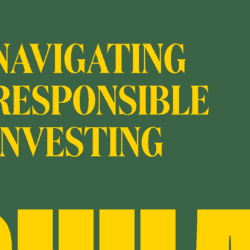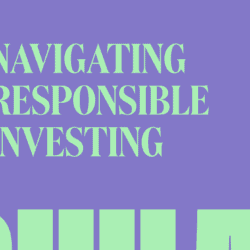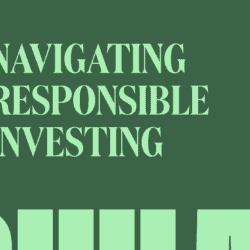Canada’s charitable sector has a unique opportunity to help shape the leadership practices and related discourse about sustainable and responsible investment, argue contributors Chad Park and Greg Elliott. In doing so, it can leverage the sector’s significant invested assets to help meaningfully address some of today’s most pressing challenges, they write.
As we grapple with evermore complex and interdependent societal issues, the charitable sector is increasingly being called upon to help address unmet needs, playing a pivotal role in contributing to the strength and resilience of Canadian communities. While the grantmaking role of charitable foundations is vitally important, there are also significant opportunities to use our investment portfolios in ways that complement grantmaking in service of our foundations’ community-strengthening goals. As a respected voice, Canada’s charitable sector has a unique opportunity to help shape the leadership practices and related discourse about sustainable and responsible investment. In doing so, we can leverage the sector’s significant invested assets to help meaningfully address some of today’s most pressing challenges.
***
The much-discussed forthcoming increase in the annual disbursement quota (DQ) for charitable foundations in Canada (from 3.5% to 5%) is motivated by a desire to boost support for registered charities in Canada, ultimately to benefit individuals and groups who access programming and services provided by Canada’s charitable sector. It is a laudable goal. And yet, charitable foundations have another valuable tool, arguably even more significant, at their disposal to drive beneficial outcomes: leveraging assets within their investment portfolios to create positive social and environmental impact while achieving positive financial returns.
Increasingly, there are opportunities for foundations to invest their assets in ways that achieve meaningful and measurable social and environmental impacts in addition to financial returns.
According to the federal government’s Department of Finance, charitable foundations in Canada have approximately $100 billion in assets under administration. Increasingly, there are opportunities for foundations to invest their assets in ways that achieve meaningful and measurable social and environmental impacts in addition to financial returns. Indeed, many foundations are already deploying portions of their portfolios to achieve such beneficial impacts. However, given the scale of societal challenges that we face, we need to do more to grow these types of investments. With a longstanding commitment to enhancing the resilience of Canadians and their communities, the charitable sector is uniquely positioned to lead on this front.
The concept of investing in a manner that aligns with environmental and/or social values and outcomes has existed for decades. In recent years, though, there has been rapidly growing interest in these type of investments as evidenced by the wide assortment of ESG funds (where environmental, social, and governance criteria are used to screen investments) in existence today. There are legitimate questions within the responsible investing space pertaining to the measurement of impact and what truly constitutes a sustainable investment. Sorting out the genuine from the insincere is important for the growing market to truly blossom; hence the plethora of standards and taxonomies emerging in the sustainable finance world today. In the net-zero investing space alone, ambitious targets have been set by major institutional investors to align investment portfolios with the science that underpins the Paris Agreement without total clarity of how investors will achieve them. But the related methodologies, standards, and investment strategies are now emerging at a breakneck speed, and the momentum is unmistakable.
The charitable sector already plays a vital role in supporting people and communities across Canada, so its voice should be a critical one in the ongoing dialogue about what constitutes meaningful investments
Despite the ambiguities that still exist with responsible investing, or perhaps because of them, there are real opportunities for groups of investors, such as those comprising the charitable sector, to be catalysts in shaping this rapidly developing field. The charitable sector already plays a vital role in supporting people and communities across Canada, so its voice should be a critical one in the ongoing dialogue about what constitutes meaningful investments that contribute to the betterment of Canadian society. But to have a voice, we have to be in the game. To be credible and influential with that voice, we have to speak from experience. In this context, that requires learning by doing.
Co-operators Community Funds (CCF) is one charitable entity that has recognized the importance of leveraging its $20-million investment portfolio in a manner that achieves positive social and environmental impacts alongside positive financial returns. The roots of CCF are in the co-operative mutual aid tradition. Co-operators established CCF in 1995 to provide an ongoing source of funding to community economic development initiatives that lead to enhanced employability outcomes for marginalized individuals, namely youth (aged 16 to 34) and individuals with mental health challenges. With a long track record of grantmaking to support organizations in communities across Canada, CCF’s board of directors also believes there is a responsibility for CCF’s invested assets to go beyond simply generating the financial returns required to underpin its grantmaking. In fact, in 2021, the board reinforced this belief by making changes to CCF’s investment policy, articulating as its primary objective achieving positive impacts associated with the transition to an inclusive, sustainable, resilient, and low-carbon-emissions society while also seeking to achieve long-term financial stability.
To have a voice, we have to be in the game. To be credible and influential with that voice, we have to speak from experience. In this context, that requires learning by doing.
Deeply committing to a sustainable investment approach with the majority or entirety of an investment portfolio may seem daunting, especially in light of the questions articulated by Allan Northcott in the preceding article in this series. The CCF board had the confidence to do so largely on the basis of its recent experience with sustainable and impact investing. Already, more than 75% of CCF’s invested assets are committed to impact investments with measurable social and environmental outcomes. This has been achieved without sacrificing financial returns.
CCF is in the fortunate position of having Addenda Capital to help navigate this journey. Addenda, which is majority-owned by The Co-operators Group Limited, is one of Canada’s largest multi-asset investment firms, with $34.3 billion in total assets (as at August 31, 2022), and a widely recognized sustainable investing leader. Notably, Addenda also manages the $12.2-billion Co-operators investment portfolio, of which 21% ($2.54 billion) is in impact investments that are measurably delivering environmental and social outcomes in addition to competitive financial returns. Managing the investment portfolio of an institutional investor that has committed to integrating sustainability in its business and to catalyzing similar efforts among others has helped Addenda develop practices and solutions from which its other clients, including CCF, can benefit.
A sustainability/impact lens has been applied to CCF’s investment portfolio across a range of asset classes. The fixed-income portion of CCF’s portfolio is largely invested in Addenda’s Impact Fixed Income Fund, one of the first fixed-income impact investment funds in Canada, which invests in diverse focus areas, including cleaner energy systems, affordable housing, non-profit seniors housing, and health services. A smaller portion of the portfolio is invested directly in smaller-scale community impact investments. Addenda has also provided CCF with a solution for its equity portfolio, through a climate transition strategy for Canadian and international equities. Using this approach, CCF’s equity portfolio will increasingly shift toward public companies that have mapped out their pathway to transition to a low-carbon-emission economy and are implementing necessary steps to reduce carbon emissions in pursuit of a net-zero-carbon-emission society. This approach focuses on emissions reductions in the real economy and offers a practical and constructive alternative to divestment, by enabling continuous engagement with forward-looking companies that are demonstrably improving performance on carbon-emission-related goals.
CCF is just one among a number of charitable organizations in Canada that are using their investment portfolios to generate positive impacts beyond what can be achieved through grantmaking alone. Much more can be done. The growing pains and relative immaturity of an emerging marketplace should not make us miss or delay a massive opportunity to increase our impact in service of the goals of the charitable sector. The charitable sector can be a leader in shaping a strong and demonstrably impactful responsible investing market in Canada. Who better to help define what “impact” and “responsible” should mean than the very institutions that have been working for generations to improve the well-being and resilience of Canadians and their communities? Adopting a leadership stance on sustainable investing creates an opportunity for Canadian charitable foundations to make their mark, individually and collectively, at this critical time. In so doing, we have an opportunity to contribute to Canada’s gaining the necessary scale of community investment that today’s challenges demand.


